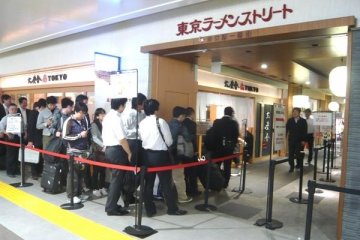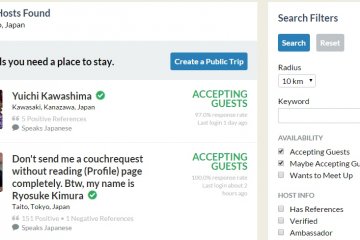Japan has a reputation as an expensive destination to visit, and it’s true that you can easily end up quickly burning through your cash if you’re not careful. With an abundance of things to see, experience, eat and buy, you’ll never be short of tempting opportunities to spend your yen. For travellers on a budget, constantly worrying about money can threaten to spoil what would otherwise be the trip of a lifetime.
However, if your plans aren’t set in stone and you don’t mind being a bit more spontaneous, there is one easy way to dramatically reduce your expenses. Couchsurfing is a global phenomenon that can be described as a ‘hospitality exchange’ website. The premise is simple: you can host travellers in your own home and also stay as a guest in someone else’s home. No money changes hands as the whole experience is based on trust, with the aim of fostering cultural exchange and building friendships around the world.
All you need to do to get started is sign up on couchsurfing.com and create a profile. It’s essential that you fill this in comprehensively and honestly, so that potential hosts can get a good idea of what you’re like. If you have friends who are already Couchsurfing members, ask them to write you a positive reference. The more complete your profile is, the more likely it is that your Couchsurfing requests will be accepted.
The next step is to search for hosts in the places you hope to visit. Although some hosts may be able to take last-minute guests, it’s politer to give plenty of notice when you send requests. You’ll be staying in someone’s home, not a hotel, so you need to remember that their plans may suddenly change, and flexibility is key. It’s a good idea to have a backup plan just in case things fall through – although hopefully that won’t happen!
There is no ‘typical’ Couchsurfing host in Japan. Members range from Japanese university students who want to practice their English to people who used Couchsurfing when they travelled abroad and now want to return the favour. Many hosts are foreign nationals who are working or studying in Japan, so if you’re worried about the language barrier, you can just as easily stay with someone from England or America as with a local. Some people may not be able to host you but are happy to meet up for a drink and to introduce you to the area.
In terms of location, there are a lot of Couchsurfing members in major cities such as Tokyo and Osaka. Don’t necessarily expect to stay in the city centre, as many people will live further out. Be aware that members in popular destinations are likely to receive requests on a regular basis, and may be too busy to host you. If this happens, it’s worth extending your search and perhaps staying in a nearby town, which will give you the opportunity to see somewhere you wouldn’t have otherwise visited.
My personal experience of Couchsurfing in Japan has been very positive. All of the hosts I’ve stayed with were very enthusiastic about Couchsurfing’s aims, and eager to share their culture. With politeness and hospitality a big part of the Japanese psyche, you’ll probably find your hosts will go over and above what is expected of them – be that by picking you up at the station, lending you their bike, showing you around or cooking you dinner. Although no payment is expected, it’s always a nice gesture to give your host a small gift as a thank you present, or offer to make dinner one evening.
Couchsurfing is a great way to meet new people and learn more about your host’s life and culture. As a tourist, you can sometimes feel as though you’re in a bubble, disconnected from the real world. Couchsurfing gives you the chance to escape from that bubble and perhaps have a more authentic experience. If you’re looking to make friends, see a different side of Japan, be adventurous and save some money in the process, this could be the ideal option for you.










